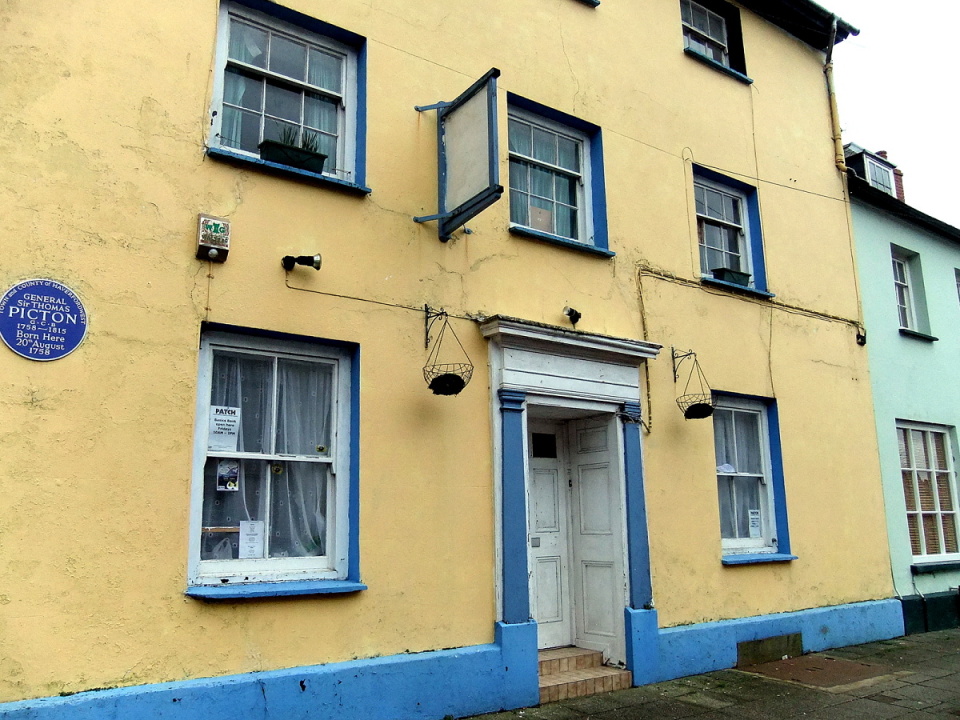Fallen on hard times
The blue plaque on this once-smart Georgian town house in Hill Street, Haverfordwest, informs us that it was the birthplace in 1758 of General Sir Thomas Picton, "Wellington's Welsh General" and the highest ranking officer to die at the Battle of Waterloo. He was honoured with a public monument in St Paul's Cathedral, London and another in Carmarthen.
Thomas Picton was the scion of a local gentry family whose country seat, Poyston Hall, lies just a few miles away and this house must have been a superior abode too. Now it looks very down-at-heel and a notice in the window indicates that it is the base for PATCH (Pembrokeshire Action to Combat Hardship), one of the many charities that have been created to support people who have also fallen on hard times as a result of the recession and benefit cuts. (This would once have been termed 'outdoor relief' as opposed to the 'indoor relief' provided by the workhouse.)
Thomas Picton was born to wealth and never fell on hard times financially but his glittering career was almost derailed by a disturbing event in his middle age. He joined the army at the age of 13, served in Gibraltar where he quelled a mutiny and some years later was appointed governor of Trinidad. His role was to protect the sugar plantations from both slave rebellions and attempts by Spain to recapture the island. His methods were harsh and relentless: "Let them hate so long as they fear" was his maxim concerning any misdemeanors, resistance, or dabbling in Obeah practices on the part of the non-white inhabitants (both slaves and indigenes). But he went too far and in 1803 he was arrested on a number of charges of cruelty and summary execution of suspects. He was returned to London to stand trial for one particular charge: that he allowed the torture, by 'piqueting', of a 14 year old mixed-race girl who had acted as an accessory to burglary. Luisa Calderon had been forced to stand with one foot upon a single wooden peg while suspended by a rope for an hour at a time.
The trial created huge publicity and contemporary illustrations made much of a barely-clothed young woman under duress while the method of her torture was dubbed 'pictoning.' Governor Picton was at first found guilty and then at a retrial, excused on the basis that under Spanish law (which was still in force on the island) it was permissable to torture slaves - although Luisa was not one. Picton's friends and supporters in the slave trade celebrated the result and rallied round to help pay his legal costs. Meanwhile he was promoted to major-general and went on to pursue his military career in the Peninsular War under Wellington with great distinction and a knighthood. Luisa, who had been brought to London to testify, returned to Trinidad and disappeared from history.
Result: rich white man 1, poor woman of colour, 0. What a surprise!
I almost forgot: while in Trinidad Picton himself enjoyed the company of a non-white mistress with whom he had 4 children; he never saw them again after he left the island.
(For those who would like further detail on this disturbing but fascinating piece of history see Newgate calendar account (includes illustration), The American Historical Review, Trinidadian Express article, and a BBC Radio Wales item (with picture of Picton).
Changing the subject: on my way to the bus stop in Haverfordwest I spotted a heron perched on a chimney stack above the main shopping parade. Motionless, it was looking down on the people below, none of whom (save me) had noticed it. I've added a couple of images to my Blipfolio - do take a look, it's quite remarkable.


Comments
Sign in or get an account to comment.


